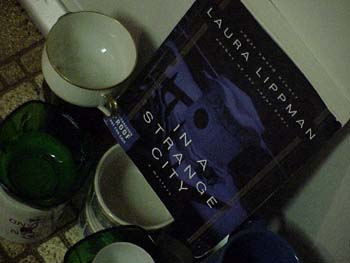


In a Strange Kitchen
How many coffee cups do you own? Quick, go count. I'll wait here for you.

Back already? Now that you've conducted your own coffee cup census, I'll confess how many I have: 26. Yes, 26 coffee cups and that does not include the dozen cups and saucers that came with my grandmother's china. Twenty-six coffee cups after I left several in a box on the doorstep at the Disabled Veterans Thrift Shop, assorted foundlings in need of a good home. Twenty-six coffee cups in a household with one coffee drinker. Twenty-six coffee cups and the coffeepot can make only four cups at a time.
Now, "In a Strange City" may not seem, at first glance, to be related to this plague of coffee cups. But it is. Before I explain this, however, I need to say a few things about Edgar Allan Poe and his life in Baltimore.
Poe is probably an inevitable subject for a Baltimore writer. Especially a Baltimore writer such as myself, who was prone to making inaccurate statements about him. First, I gave his birthplace as Virginia in "Baltimore Blues." Oops, it was Boston.
Then, I announced, at the Edgar ceremony of all places, that he died from rabies. Turned out the rabies theory had been discredited. There are more than 20 theories about Poe's death and no single one is wholly satisfactory to Poe partisans. For those who want to get it right, I suggest visiting the website for the Edgar Allan Poe Society of Baltimore.
Poe is buried in Baltimore, where he died in 1849 under -- of course -- mysterious circumstances. In 1949, an anonymous visitor, aka the Poe Toaster, began visiting the writer's original gravesite. (His body had since been moved to a more prominent place in the graveyard.) The visitor, who has been photographed from a distance but never unmasked, leaves three roses and a half-bottle of cognac between the hours of midnight and dawn on Jan. 19th, Poe's birthday. Very little is known about the Toaster. A note left in the late 1990s suggests that several individuals have played this part. Just this year, Baltimore was shocked when, on the eve of the Super Bowl, the Toaster left a note indicating he was a Giants fan. Oh, the perfidy!
So that's the Poe angle. But material possessions were also on my mind as I began to write "In a Strange City." The economy was still hot, newspapers were full of the outrageous excesses of wealthy young Wall Streeters, catalogs filled my mailbox. I began sneaking back onto eBay, after an 18-month hiatus, looking for new stuff even as I was trying to get rid of my old stuff. I wanted less, I wanted more. That's how I ended up counting my coffee cups the other day.
Now, several of my coffee cups are gifts from people I cherish, so I cherish their mugs. Some come from independent mystery bookstores, which help put the fresh ground French Roast on my table. But a few have no emotional resonance whatsoever. And they're ugly, hideously ugly, and I will never use them, even if I have a dinner party for 26 people and everyone wants coffee. So why can't I get rid of them? I still haven't figured that out. But I did figure out why the characters in "In a Strange City" are fixated on various items, many of them seemingly worthless to rational folks. (Although I think we can all agree that the giant ball of string is a thing of beauty.)
The point of the coffee cup story -- some of you may be surprised to learn there is any point to this at all -- is that no reader, however discerning, could ever guess at this odd inspiration for "In a Strange City." This brings me, in the most round-about fashion possible, to my favorite quote from my favorite crime writer, James M. Cain.
For years, Cain's style was compared to Hemingway's and Hammett's. He had even been criticized for letting his exposure to film sets affect the way he wrote dialogue. In a preface to "The Butterfly," Cain decided to set the record on a few things. He wrote, in part, to those who had made all sorts of inferences about this work: "You're being a little naive, you know. We don't do it that way. We don't say to ourselves that some lucky fellow did it a certain way, so we'll do it that way too, and cut in on the sugar. We have to do it our own way, each for himself, or there isn't any sugar."
I will be out and about for much of September, October and even November. You'll find my tour schedule here. I look forward to meeting people on the road. And if you bring me a coffee cup, I'll use it with great pleasure. At the very least, I'll know someone is reading this page.
P.S. I just went back and counted. I erred. I have 28 coffee cups. And it almost became 29 over the weekend because I was mightily tempted by a "Wizard of Oz" mug at the Library of Congress, with an illustration from the book.
P.P.S. This just in -- Publishers Weekly gave "In a Strange City" a starred review:"Edgar, Shamus, Anthony and Agatha award winner Lippman (Charm City; Butchers Hill; The Sugar House) pays homage to the inventor of the mystery form in this masterly contemporary mystery, set in Baltimore and replete with her trademark dry, sardonic wit. Every January 19th, in honor of Edgar Allan Poe's birthday, a loyal clique waits in the small hours for the "Visitor," also known as the "Poe Toaster," to approach Poe's tomb. He wears a formal cape and carries three blood-red roses and a bottle of cognac as tribute. For some reason the press keep their distance, as do bystanders. This year, for the first time, PI Tess Monaghan is present, too, along with her boyfriend, Crow. Having been roped into attendance by a would-be client, Tess awaits the coming of the Visitor in the freezing winter night. Suddenly, two caped men with roses and cognac show up. A shot rings out one man lies dead, the other runs off. A deliciously complex story follows that brings Baltimore center stage and delves anew into the mysteries surrounding Poe himself . . . Lippman shows in this, her sixth novel, that she's indeed deserving of all the kudos she's received."
Read The "D" Word.
| Home | Books | FAQ | | Archives | E-mail | Newsletter |
| Biography | Writings | Interviews | Links | Search |
